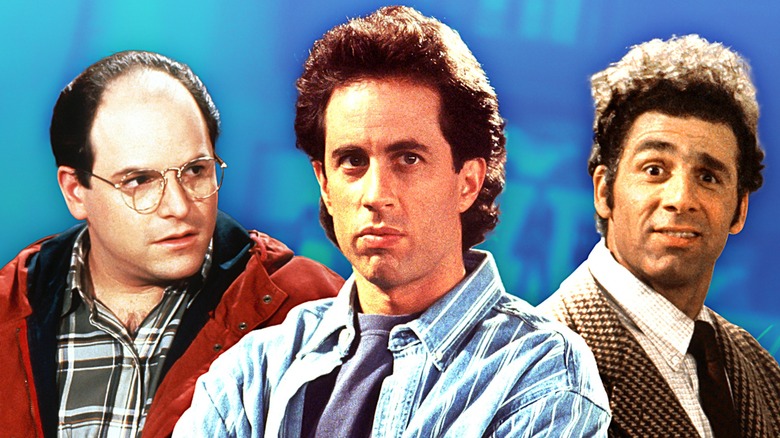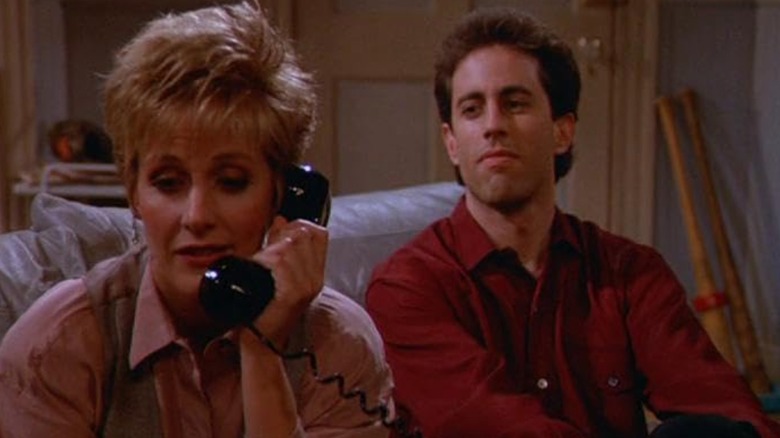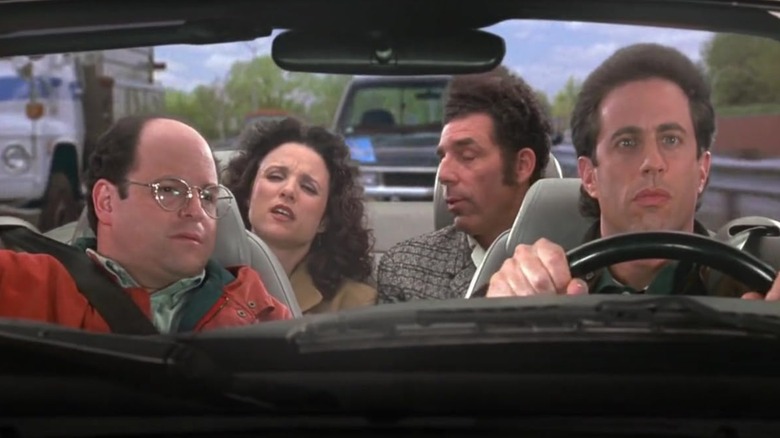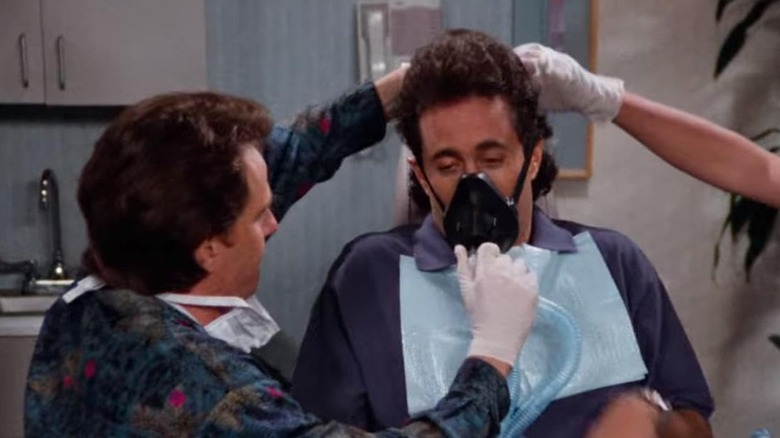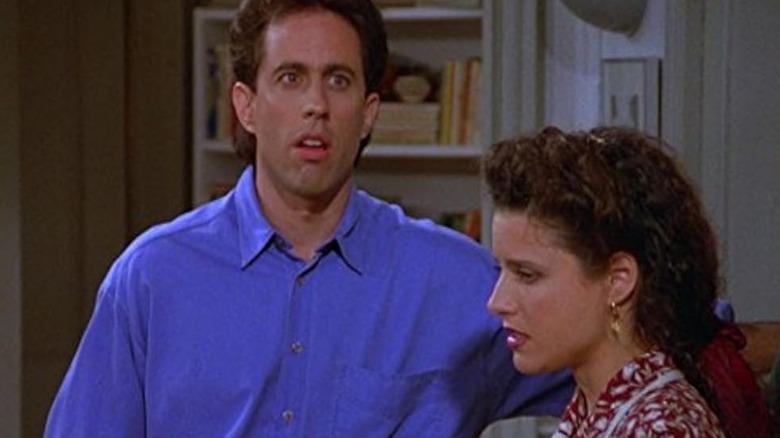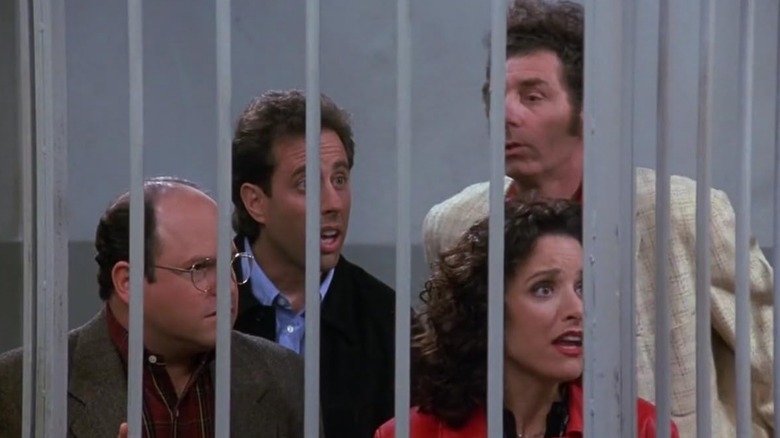The 5 Worst Episodes Of Seinfeld, Ranked
For a show with 180 episodes, "Seinfeld" has oddly few stinkers. Larry David and Jerry Seinfeld's magnum opus took the TV landscape by storm throughout the '90s, but the show still remains fresh –- and funnier than almost anything else on television, before or since. Across its nine seasons, "Seinfeld" honed and then perfected its distinctive style of comedy, bringing viewers increasingly labyrinthine and rewarding standalone stories of misunderstandings, faux pas, and assorted disasters –- all memorably set in the creators' unpredictable vision of New York City.
For all its greatness, though, "Seinfeld" has a few low points, and I don't just mean the clip shows. Its first season doesn't start off particularly strong, though its early episodes build a solid platform onto which later, more intricate comedic plots can expand. Likewise, season 4 spends long stretches of time focused on George (Jason Alexander) and Jerry's (Seinfeld) attempt to write a TV show, and while the season gave us the "show about nothing" tagline that's stuck with the series ever since, its comedic momentum slows some when it attempts to take on real, serialized storylines. The later seasons of "Seinfeld" also see its core group –- neurotic Jerry, selfish George, eccentric Kramer (Michael Richards), and opportunistic Elaine (Julia Louis-Dreyfus) — grow almost cartoonishly evil, and while some of those later episodes are the show's best, the series' amoral high-wire act eventually comes crashing down courtesy of its deeply polarizing, still-frustrating series finale.
Unsurprisingly, you'll find that episode here, along with four others that, thanks either to their inherent faults or to the eye-opening passage of time, are now among the show's most skippable.
5. The Seinfeld Chronicles
Unlike some of the show's worst chapters, the pilot episode of "Seinfeld" (which is also sometimes called "Good News, Bad News") isn't offensive or unintentionally off-putting; it just doesn't feel like "Seinfeld." There are a few signs of the clever, misunderstanding-based comedy the show would become, including in a main plot that sees Jerry trapped in relationship purgatory with a houseguest (Pamela Brull) who's sending extremely mixed signals. But since this is the show's first episode, there isn't any B plot, which ultimately makes the whole endeavor feel simplistic compared to the majority of the series' other chapters.
"The Seinfeld Chronicles," as the pilot was titled, at times feels like an entirely different show. There's no Elaine, and Kramer was famously first introduced as Kessler. A waitress at the diner –- not the one we know and love, but a different place called Pete's Luncheonette –- seems poised to be a main character in the show, but actor Lee Garlington is never seen again after this episode. The pilot had just enough juice to get the show picked up and give it a chance to become something great, but since it's so unlike "Seinfeld" as a whole, it's the easiest episode to skip on rewatch. And while it's the only season 1 episode on this list, most of the series' earliest efforts were relative duds, with "Male Unbonding" and "The Stock Tip" standing out as additional low points.
4. The Puerto Rican Day
One of the most controversial episodes of "Seinfeld," the season 9 outing "The Puerto Rican Day" inspired protests that bled over into the week of the show's series finale. The episode, which memorably traded in the show's familiar settings and instead took place in a traffic jam caused by New York's annual Puerto Rican Day Parade, was considered offensive due to a scene in which Kramer accidentally burned –- and subsequently stomped on –- a Puerto Rican flag. According to Jennifer Keishin Armstrong's book "Seinfeldia," National Puerto Rican Coalition president Manuel Mirabal's request to have Hispanic consultants check out the show before it aired was denied, with writer Alec Berg at one point saying, "We don't consult a rabbinical council when we do a show about Jews."
Puerto Rican flag incident aside, the episode just isn't very good, which is especially depressing given that it's the penultimate of the entire series. Bits and pieces of "The Puerto Rican Day" work, like when Jerry, George, and Kramer accidentally abandon their car after they one by one decide to attend an apartment showing under presumed names to use its bathroom. But its lack of familiar settings and group time is jarring, its racial humor too broad and dehumanizing, its script not sharp enough to pull off the real-time method, and its hijinks less convincing than so many that came before. As the show's penultimate episode, "The Puerto Rican Day" inadvertently acts as evidence that the powers-that-be were right to end "Seinfeld." Unfortunately, it's not the worst season 9 had to offer.
3. The Jimmy
While some aspects of "Seinfeld" have aged poorly with time, "The Jimmy" might be the only episode that crosses over from "out of touch" to "disturbing." The episode's main issue lies with Jerry's plot, an incredibly bizarre and painfully unfunny bit about a dentist's office staffed by swingers who apparently sexually assault him while he's unconscious. Male sexual assault was regularly played for laughs and misunderstood on screen in the 20th century (and, on occasion, still is today, unfortunately), so it's not surprising that "Seinfeld" would go there to some capacity, but I don't believe there was ever a time when "doctors who molest you when you're asleep" was a topic of robust and relatable comedy. Not even a guest star stint from Bryan Cranston can make things much better, though it's worth noting that his turn as the dentist saves the ill-advised episode from becoming unsalvageable.
"Seinfeld" successfully played with dark humor plenty of times throughout its run ("The Junior Mint," in which Jerry and Kramer think they killed a guy by dropping candy in his body cavity during surgery, is arguably the show's best episode), but the dentist plot is especially gross because it keeps its assault storyline light and offers zero resolution or explanation. George reads about Jerry's assault in Penthouse, and Elaine (horrifyingly) tells him the violation was fine because he's single. In a show that gleans humor from the weirdos of the world, "The Jimmy" swings too far and loses its comedic thread in the process. Elsewhere in the season 6 episode, George and Elaine get confused by a man who refers to himself in the third person, and Kramer is mistaken for a member of the group "Able Mentally Challenged Adults."
2. The Dog
An odd plot about a drunk man on a plane talking Jerry into dogsitting bogs down the otherwise great third season of "Seinfeld." In "The Dog," Jerry ends up with a dog called Farfel, and the pooch proceeds to make his and everyone else's lives a living hell while its owner convalesces in the hospital. This is one of a handful of instances in the show where Seinfeld and David draw on presumably personal pet peeves that don't translate to a larger audience, and a "Seinfeld" hot take doesn't get much more unpopular than "Dogs are the worst."
The episode certainly seems to think they are, though, as Jerry eventually takes the poor pup to the pound so he can go out with friends, the previously empathetic Elaine threatens to put an end to Farfel after spending time with him, and it's eventually revealed that the pet's original owner (Joseph Maher) left the hospital days earlier but didn't come get him. Aside from the tonal misjudgment of an episode that tries to make a punchline out of everyone hating this dog, fans seem to have a particular distaste for the weirdly human barking that punctuates nearly every scene of "The Dog." Rather than show us Farfel, the episode features a relentless barking audio track that's clearly just a man. The Farfel bark is near-unbearable, and hilariously, several Reddit fans who fall asleep rewatching "Seinfeld" have even noted that it's one of the only noises in the whole series that's grating enough to wake them up.
1. The Finale
While episodes like "The Dog," "The Jimmy," and "The Puerto Rican Day" might irritate or offend fans due to writers' room miscalculations, the worst episode of the show does exactly what it was meant to do. Unfortunately, Larry David's choice to end the series with an alienating, unfunny, cruel, and somehow mundane departure from the show's status quo was the worst decision "Seinfeld" ever made. The two part episode feels less like a sendoff for the wildly funny show America loved and more of a final "screw you" to the network David had fought with years earlier – a meta continuation of a conversation about the sitcom's moral and social function that the audience was never actually privy to.
It would have been one thing if the final episode had simply tanked fans' remaining goodwill for its increasingly terrible cast of characters, but "The Finale" was also buried under the weight of its many zany narrative choices and strange, plodding structure. Kramer aside, the show had been telling us for years that its group was no good, but its also reveled in its characters' amorality and neurosis, making their trial feel like an unnecessary, outdated bait-and-switch. To punish the four was to stick an oddly unpleasant, sarcastic "Is this what you wanted?" ending onto a show that could've had its full circle moment (as it eventually did in the jail cell) literally any other way. The finale also eliminates the well-earned suspension of disbelief with which it's been holding audiences captive for so long, replacing nimbly assembled, multi-part comedic tableaus with a simple, rubbish story that rings false every step of the way.
"The Finale" stinks so bad that David has spent most of his life since being asked about it again and again. It's an existential punishment he examined at length in his next series, "Curb Your Enthusiasm," before revisiting the "Seinfeld" sendoff one last time in that show's series finale.
